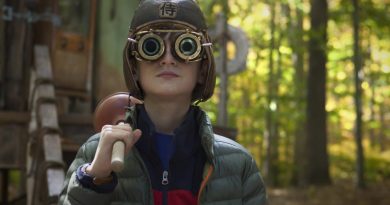The Glass Castle (12A) | Close-Up Film Review

Dir. Destin Daniel Cretton, US, 2017, 127 min
Cast: Brie Larson, Woody Harrelson, Naomi Watts, Sarah Snook, Ella Anderson
Review by Carol Allen
Based on an autobiographical memoir by American journalist Jeannette Walls, the film tells the story of Jeannette’s unconventional childhood and particularly her relationship with her eccentric and flamboyant father Ray (Harrelson).
Ray Walls and his artist wife Rose Mary (Watts) see themselves as unconventional free spirits, who want nothing to do with the constraints of society, and are raising their children accordingly. Jeannette, her two sisters and brother spend their childhood on the road, living rough in cars, camp sites or under the stars. The family finally sort of settles in a ramshackle West Virginia house, which Ray dreams of turning into the eco-friendly “glass castle” of the title. But because he is who he is, it is a futile dream.
The story is told largely in flashback with Chandler Head and then Ella Anderson (really talented) playing Jeannette as a child. Even though this is ostensibly her story, Brie Larson as the sophisticated and successful adult Jeannette in the eighties doesn’t get much of a look in until the latter part of the film, except to look sophisticated and tight lipped, when we come out of the flashbacks and into the present.
The centre of the film is Ray and Harrelson plays this contradictory and charismatic character to the hilt. Ray is a man of many talents, a dreamer, an idealist with contempt for society’s material values and a charmer. He is also irresponsible, cruel and violent – the scene where he teaches Jeanette to swim by throwing her over and over again into deep water is deeply disturbing. He is selfish and an alcoholic. At one point he steals money from his daughter – money she has been saving towards her escape into a better life. Yet conversely Ray can also be loving and generous.
There is one terrifying scene near the beginning of the film where Jeannette, aged about four, unsupervised by her mother, who is absorbed in her painting, starts to cook some hot dogs and accidentally sets fire to herself. When the authorities start taking an interest in hers and the other children’s welfare, Ray and the other children stage a kidnap attempt, “rescue” the Jeannette from hospital with her burns half healed and take to road. All very swashbuckling but also somewhat shocking.
The film is virtually a tribute to Ray and his contradictions and dysfunction. Watts is appealing as the fey, ineffectual but loving wife and mother of the family, though the character is unsatisfyingly largely pushed into the background with Ray and his relationship with young Jeanette always in the centre. Jeanette’s siblings too are explored in a limited way, though Sarah Snook makes an impression as Jeannette’s closest sister Lori.
On one level this is a strong, often horrifying tale about a woman, who rises above the dysfunctional childhood which shaped her to make a success of her life – and indeed write a very successful bestseller about it. The film’s makers claim it as a story of unconditional love and the strength of family, though this somewhat sentimental view doesn’t really kick in until near the end of the film. Up to then it is almost a primer on how not to bring up your children.
There is though something that feels dishonest about the way the film ultimately glamourizes Ray, particularly in that sentimental conclusion. In an epilogue we are shown some enlightening documentary footage and home movies of the real life Ray, Rose Mary and their children, which gives us a tougher and more realistic picture of the characters and is in rather startling contrast to their fictionalised selves in the main body of the piece. The film certainly holds your attention but I get the feeling that the reality of Jeannette’s story has been given more than a touch of Hollywood gloss.


